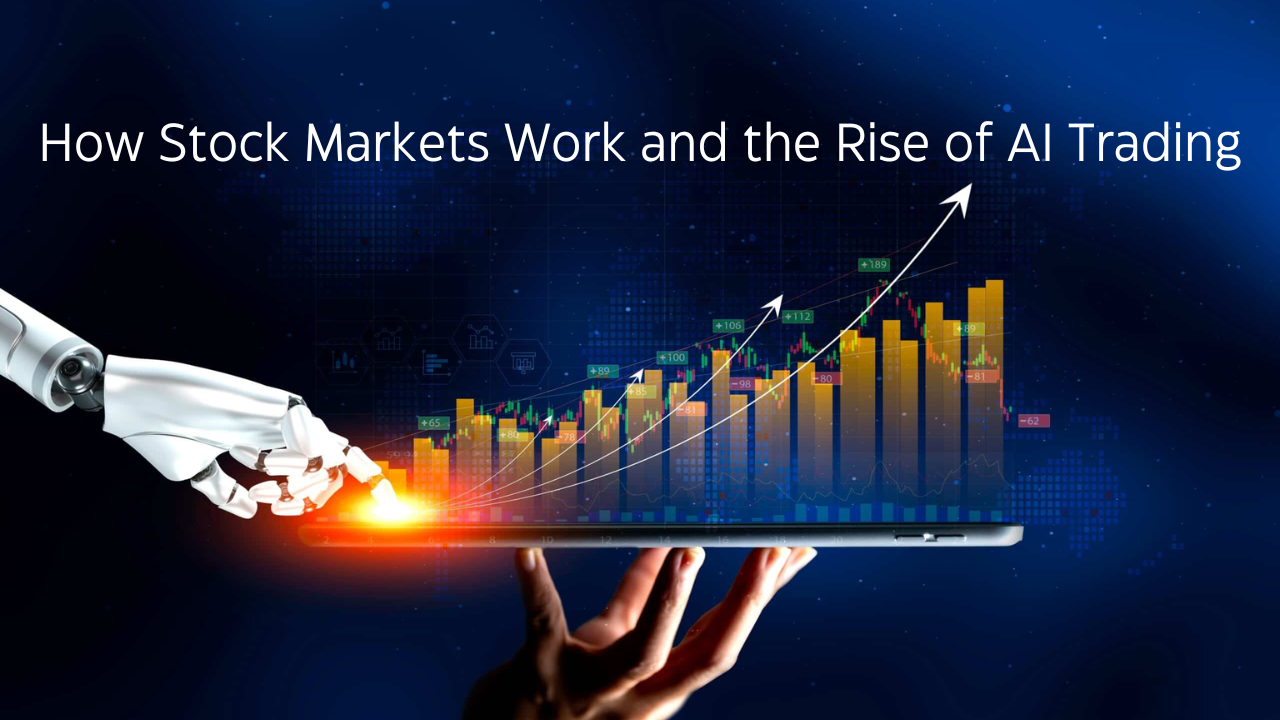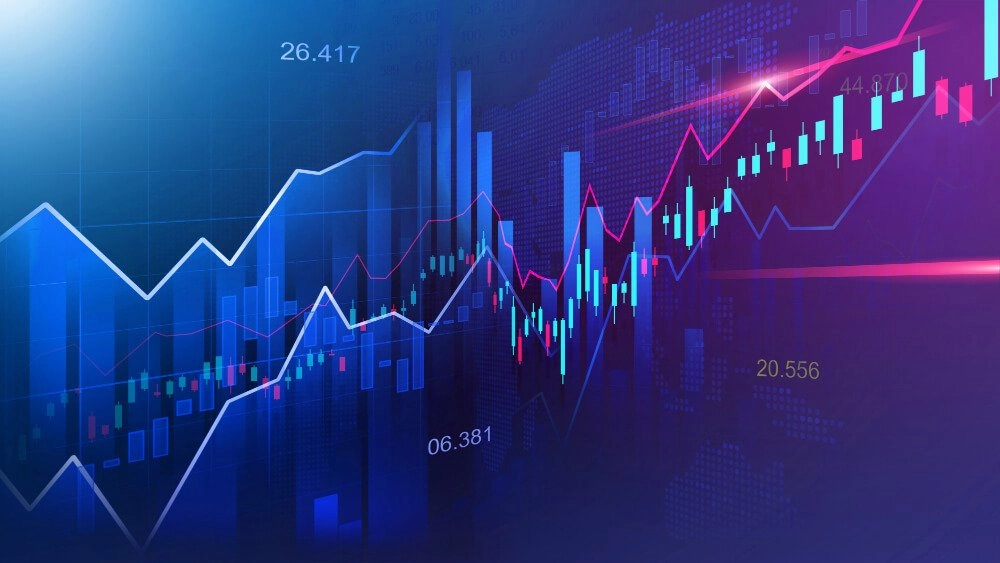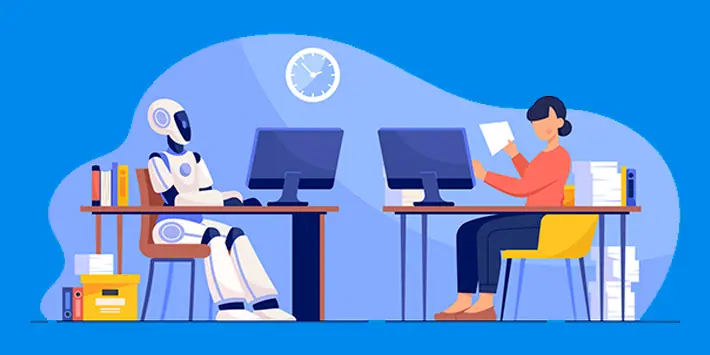How Stock Markets Work and the Rise of AI Trading
 Aakashi Jaiswal
Aakashi Jaiswal
Ever wondered how the stock market actually works? Or how artificial intelligence is changing the way we trade? Let's break it down in simple terms - no fancy jargon, just straight talk about this fascinating world that affects all our lives.
What Is a Stock Market?
Think of the stock market as a huge marketplace - like Amazon or eBay, but instead of buying products, people buy and sell small pieces (shares) of companies. When you own a share, you actually own a tiny part of that company. Pretty cool, right?
The main reason companies sell shares is to raise money for growing their business. Instead of taking a huge loan from a bank, they can sell small pieces of ownership to thousands of people. It's like crowdfunding, but you get to own a piece of the company!
How Does Trading Actually Work?
Gone are the days when traders would shout and wave papers on the trading floor (though some still do at places like the New York Stock Exchange). Today, most trading happens electronically through computers. Here's how it works:
-You decide you want to buy shares of a company (let's say Apple)
-You place an order through your trading app or broker
-The order goes to an exchange (like NASDAQ)
-The exchange matches your "buy" order with someone's "sell" order
-Money and shares are exchanged electronically
-You're now a proud owner of Apple shares!
What Makes Stock Prices Go Up and Down?

This is where it gets interesting. Stock prices change constantly based on supply and demand, but what drives these changes? Here are the main factors:
-Company Performance: Good earnings reports? Price usually goes up. Bad news about products? Price might drop.
-Market Sentiment: Sometimes prices move based on how people feel about the future. Optimistic? Prices rise. Worried? They fall.
-Economic Factors: Interest rates, inflation, economic growth - all these big-picture things affect stock prices.
-Global Events: Pandemics, wars, natural disasters - the stock market reacts to major world events.
Enter Artificial Intelligence: The New Player
Now, here's where things get really exciting. AI has revolutionized how the stock market works in ways that would seem like science fiction just a few decades ago. Let's look at how AI is changing the game.
1. Lightning-Fast Trading
Remember when I said trading happens electronically?
Well, AI takes this to a whole new level with something called High-Frequency Trading (HFT). These AI systems can:
-Make trades in microseconds (that's millionths of a second!)
-Spot price differences across different exchanges
-Execute thousands of trades before a human could blink
2. Smarter Market Analysis
AI is like having thousands of research analysts working 24/7. It can:
-Read and analyze news from around the world instantly
-Process company financial reports in seconds
-Identify patterns in market data that humans might miss
-Track social media sentiment about companies and markets
For example, some AI systems can analyze satellite images of retail parking lots to estimate store sales before official reports come out. Mind-blowing, right?
3. Personalized Investment Advice
Remember the old days when you needed an expensive financial advisor to help you invest? AI has democratized this through "robo-advisors." These smart systems can:
-Create personalized investment portfolios
-Automatically rebalance your investments
-Provide 24/7 portfolio monitoring
-Offer this service at a fraction of traditional costs
4. Risk Management
AI excels at detecting and managing risks:
-Spotting unusual market behavior that might indicate fraud
-Predicting potential market crashes
-Adjusting portfolios to protect against losses
-Monitoring global events that might affect markets
The Human Touch: Why We Still Need People
With all this AI power, you might wonder if human traders are becoming obsolete. Not quite! Here's why humans are still crucial:
-Complex Decision-Making: While AI is great at processing data, humans are better at understanding complex situations and making judgment calls based on experience.
-Emotional Intelligence: Markets are influenced by human psychology and behavior. Understanding these emotional factors often requires human insight.
-Creative Strategy: Humans can develop new trading strategies and adapt to unprecedented situations in ways AI currently cannot.
-Ethical Oversight: Someone needs to ensure AI systems are used responsibly and ethically.
AI and Humans Working Together

The future of stock markets isn't about AI replacing humans - it's about collaboration. Here's what this might look like:
-AI handles the rapid data processing and routine trades
-Humans focus on strategy and complex decision-making
-Better tools for retail investors (that's regular folks like us)
-More transparent and efficient markets
Tips for Regular Investors
If you're thinking about investing in stocks, here's how to approach it in this AI-driven world:
-Start Small: Use robo-advisors to get started with minimal risk
-Stay Informed: Understanding basic market principles is still important
-Don't Chase Trends: Just because AI can trade fast doesn't mean you should
-Think Long-Term: The best investment strategies often involve patience
Challenges and Considerations
While AI has brought amazing advantages to stock markets, there are some challenges to consider:
-Technology Risks: When systems fail, they can fail spectacularly
-Market Volatility: AI-driven trading can sometimes amplify market swings
-Access Inequality: Not everyone has access to the same AI tools
-Regulatory Challenges: Laws and regulations are still catching up
The stock market has come a long way from its origins as a meeting place for traders in coffee houses. Today's market is a fascinating blend of human insight and artificial intelligence, working together to create opportunities for both big institutions and regular investors.
While AI has made the market more efficient and accessible than ever, it's important to remember that successful investing still requires patience, understanding, and a clear strategy. Whether you're using the latest AI-powered trading app or working with a traditional broker, the basic principles remain the same: do your research, understand your goals, and invest wisely.
The future of stock markets will likely see even more AI integration, but the human element - our ability to think creatively, understand context, and make nuanced decisions - will always play a crucial role. After all, at its core, the stock market is still about people and their beliefs about the future of companies and the economy.
Subscribe to my newsletter
Read articles from Aakashi Jaiswal directly inside your inbox. Subscribe to the newsletter, and don't miss out.
Written by

Aakashi Jaiswal
Aakashi Jaiswal
Coder | Winter of Blockchain 2024❄️ | Web-Developer | App-Developer | UI/UX | DSA | GSSoc 2024| Freelancer | Building a Startup | Helping People learn Technology | Dancer | MERN stack developer